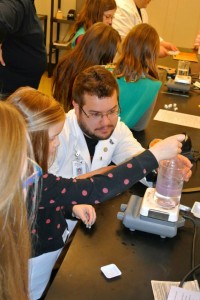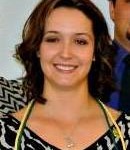
East Tennessee State University’s chapter of Generation Rx earned the title of second place national chapter in 2013. To find out what makes their program so successful, we interviewed Brandie LeBlanc Clawson, the Generation Rx Committee Chair, and Jake Peters, a pharmacy student and President of the Tennessee Society of Student Pharmacists.
Here is what they had to say about Generation Rx at their university:
 The students at East Tennessee State University have been recognized nationally for their work in prescription drug abuse prevention. What has made your school so successful in its Generation Rx projects? What advice can you offer to other colleges to help prevent the misuse and abuse of prescription medications?
The students at East Tennessee State University have been recognized nationally for their work in prescription drug abuse prevention. What has made your school so successful in its Generation Rx projects? What advice can you offer to other colleges to help prevent the misuse and abuse of prescription medications?
Brandie: Commitment, Innovation, and Collaboration are what I would say make our program at ETSU successful. Due to our location in Appalachia prescription drug abuse is a big issue. Our families, friends, and community are all affected by the issue making it hit home for a lot of people. To help prevent prescription drug abuse and misuse in their communities use your current resources available and expand from there. The pre-fab materials from Cardinal and Ohio State University are readily available and a great way to get started. Empower and partner with other individuals and community partners. We got our start at ETSU through a local detention center and by having our student pharmacists reach out to their high school teachers to allow us to present there. Each college of pharmacy is also unique so take the pulse of your school and community prior to designing your program; this will ensure the longevity of your program in the community.
 If you were starting Generation Rx activities at another school, what is the first thing you would do?
If you were starting Generation Rx activities at another school, what is the first thing you would do?
Jake: Find your niche. Each community has a different need as it pertains to prescription drug abuse and misuse, so examining your population is key to developing a successful program. Once you’ve identified your target areas, take the available resources you have from APhA-ASP, Cardinal Health, and the Generation Rx Initiative website maintained by Ohio State and adapt them to meet those needs. Prescription drug abuse is a national problem, one that doesn’t have a one-size-fits all solution, so the more innovative and informative you can be with your programming, the better.
 What does Generation Rx mean to you?
What does Generation Rx mean to you?
Brandie: As cliché as it might sound Generation Rx is a program I have been waiting for. It provides student pharmacists with a way to educate individuals, communities, healthcare providers, and most importantly us as pharmacists. Prior to starting pharmacy school I worked as a critical care registered nurse and saw the heart break prescription drug abuse caused in my community. Since starting pharmacy school I have a completely different understanding and feeling about prescription drug abuse due to the program. I challenge anyone who works this program not to have a change of heart or mind once they begin to learn the mechanisms of devastation this disease causes. I am now a more empathetic person toward the people suffering from this disease and feel empowered to help them combat their disease.
 What is the most memorable experience you have had while teaching others about prescription drug abuse?
What is the most memorable experience you have had while teaching others about prescription drug abuse?
Jake: By far it has been the stories. Numerous times when we have talked with the youth, we have had students come to us with stories of how they have been affected by prescription drug abuse, either by themselves, a friend, or a family member. While this can be disheartening to have a face, often a young and innocent one, to put with the problem of prescription drug abuse, what makes this a positive is that every time, those students have told us how our program has inspired them to change things for the better and that they’re excited to make that difference in their life.
Why do college students need to be concerned about medication safety?
Brandie: College students are at a pivotal point in their lives, the choices they make today will directly affect the rest of their life. Medications, while safe when taken appropriately have dangerous side effects when they are misused or abused. No one sets out to become an addict; without education about proper medication safety college students are setting themselves up to have a life-long disease that is avoidable.
 If you could tell everyone only one thing about prescription drug abuse, what would it be? Why?
If you could tell everyone only one thing about prescription drug abuse, what would it be? Why?
Jake: Prescription drug abuse doesn’t play favorites, choose sides, or affect only certain populations. It doesn’t matter how successful you are or if your life is in a complete rut, prescription drug abuse can grab a hold of you and hang on a lot harder than you can ever imagine. Staying informed and making the right decisions to avoid even the risk of prescription drug abuse is key. But if prescription drug abuse is something that you or someone you know struggles with, remember that addiction is a disease, just like diabetes or high blood pressure. It can be treated and people need support. Find a way to be that support system for someone or seek that support for yourself. Addiction is not a terminal illness if you choose to take it head-on.

